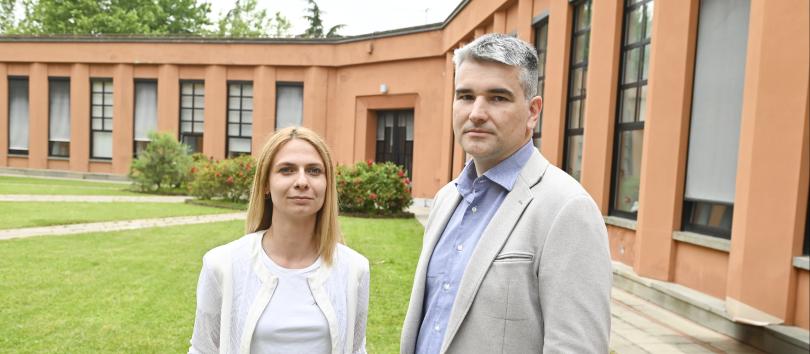
Agri-tech in the Western Balkans: the stories of Ivona Trajanovska and Srdjan Tadic
The Western Balkans, a region celebrated for its cultural diversity, is rapidly emerging as hub for agri-tech innovation. Central to this development are inspiring stories such as those of Ivona Trajanovska and Srdjan Tadic. Trajanovska's Pro-Fit Vis promotes healthy eating through high-protein, low-carb food products, while Tadic's Atfield specialises in viticulture technology, with their WineSense™ system that monitors vineyard microclimates. Their entrepreneurial spirit is not only improving agriculture, but also setting an example in the region.
They attended the "Skilling up the Western Balkans agri-food sector" third foresight workshop at the European Training Foundation (ETF), last 6–7 June. This workshop is part of a broader project aimed at enhancing skills in the agri-food sector, focusing on creating a roadmap to address skills needs in the agri-tech, organic and functional food sectors in the Western Balkans.
Ivona Trajanovska: Empowering youth and promoting healthy living
Trajanovska, co-founder of Pro-Fit Vis and the NMK Youth Business Association, has dedicated her career to improving health and entrepreneurship in North Macedonia. Her journey began with a simple yet profound observation from her studies in Slovenia.
“What struck me was: people were healthy there. No fat people. And we are only a thousand kilometres away!”
This realisation pushed her to bring healthier food options to her homeland.
Despite facing significant financial hurdles, including the bankruptcy of her bank, Trajanovska’s determination led her to secure funding from the Fund for Innovation and Technology Development. This support allowed her to continue her work and expand her product line from three to fifty items in just six months.
Trajanovska is also the founder and president of the Union of Young Entrepreneurs Phoenix Rising, a platform for young business minds to connect, collaborate, and innovate. This organisation has grown to 75 members. Her digital initiative, "Gen AI biz", aims to train young entrepreneurs in artificial intelligence, equipping them with the skills needed to thrive in the modern business landscape.
“Learning how to use AI properly will allow people to save time at work. For example, in my company, I use it for doing tenders,” she explains.
This initiative is supported by international donors and includes collaborations with Serbian and Montenegrin entrepreneurs through the Western Balkans Funds.
Srdjan Tadic: Integrating technology with tradition in viticulture
Tadic's journey in agri-tech began when a friend with a vineyard needed a solution to leave his fields for few days, and finally go on holiday. Driven by his background in electronics, Tadic started exploring how technology could support farmers in viticulture. His company, Atfield, developed WineSense™, a decision support system designed to optimise vineyard management through a sensor network.
“Even within 200 metres in a vineyard, you can have a 9 degrees Celsius difference, or 60% humidity, and this has an impact on the spread of potential diseases on the grapes. So, we realised our product could make a difference for winemakers to spray less, thus saving money and time,” Tadic explains.
WineSense™ provides real-time data on microclimate conditions, allowing producers to target their interventions with more precision and reduce their environmental impact by minimising the use of chemicals.
Atfield's technology has proven its value through practical applications. In collaboration with the United Nations Development Programme, they monitored 45 hectares and achieved a 38% reduction in spraying.
"Agriculture is risky, and technology is the best ally they can have. In case of a bad season, small producers are out of business,” Tadic notes.
By making advanced technology accessible and mostly affordable (costing just 2 to 3 euro cents per bottle), Atfield supports the sustainability and resilience of small wine producers.
Despite the challenges posed by the COVID-19 pandemic, when the technology was first prototyped, Tadic’s perseverance paid off. Atfield now serves 150 wine managers across 8 countries and relies on a team of 12 engineers. The company's impact on the viticulture industry is undeniable, demonstrating the power of integrating technology with traditional practices.
Digital innovation: A common guideline
Both Trajanovska and Tadic demonstrate how digital innovation can have an impact on the agri-tech sector. Trajanovska’s use of AI in business processes and her initiative to train young entrepreneurs in AI highlight how technology can revolutionise the efficiency and competitiveness of enterprises. Tadic’s WineSense™ system uses sensor technology and data analytics to transform vineyard management, accessible via a dedicated and easy-to-use app on a smartphone.
Their stories illustrate the emerging agri-tech sector in the Western Balkans. By combining traditional knowledge with cutting-edge technology, Trajanovska and Tadic are not only improving agricultural practices, but also inspiring a future generation of entrepreneurs. With vision and perseverance, they prove that it is possible to make a lasting impact at both local and regional levels.
Did you like this article? If you would like to be notified when new content like this is published, subscribe to receive our email alerts.